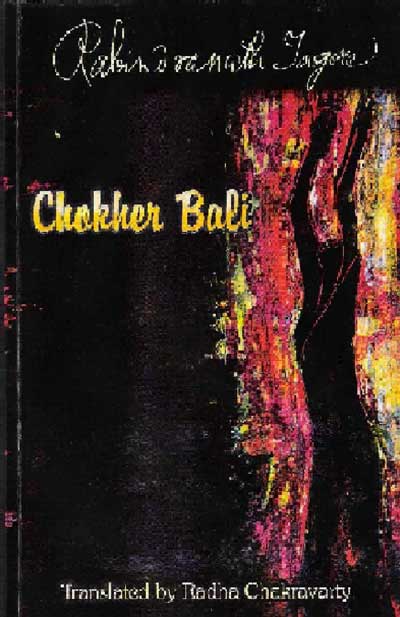Contribute
| Book Review - Choker Bali |
Nirmala Garimella
06/14/2004
Chokher Bali
by Rabindranath Tagore ( translated in English by Radha Chakravarthy)
Srishto Publishers and Distributors
Pages 413
In his preface to Chokher Bali, Rabindranath Tagore wrote, “ The Literature of the new age seeks not to narrate a sequence of events , but to reveal the secrets of the heart” Such is the narrative mode of Chokher Bali, translated in English by Radha Chakravarthy who teaches English at the Gargi college in Delhi.
Claimed as a masterpiece for its boldness of approach and thematic content, this fascinating novel written in 1903 established the coming of the Modern Indian Novel that dwelt for the first time on human frailities and emotions rather than the established literary tradition of the plot and external action.
The novel’s protagonist is Binodini, a beautiful young widow who enters the house of Mahendra and Asha, newly married and living in total conjugal bliss. The couple's harmonious relationship takes an unexpected turn when Mahendra falls passionately in love with Binodini and unleashes forbidden emotions in the entire family. His closest friend Bihari, is also smitten with her and we watch as Asha helplessly witnesses the changes taking place within the home. Her mother in-law initially accuses her of not holding on to her son but later becomes her closest ally. All these complex patterns in relationships take a toll on the family and bring with it a degree of separation, and in Bihari’s words “a deep pain that is neither expressed in words nor cherished in the mind”. Binodini in her insecurity and emotional fallibility first succumbs to Mahendra’s love then devotes herself to win over Bihari. Tagore brings out the intensity of her feelings and her state of mind at different times in the story. The myriad emotions take the reader thru the labyrinth of the protagonist's on–again, off–again, on- again, off again love affair to interpret her own life.
According to Chakravarthy, Tagore wrote this during a period when the forces of tradition and modernity, Hindu orthodoxy and British liberalism created a contradictory social milieu. The recurrent strands of his thoughts - family, loyalty, honor, education, woman’s status – gain resonance each time and stand in the end for the complexity of a whole greater good than the sum of its parts. So while we read that Bihari and Mahendra pursue medicine, the women remain inadequately literate. While Binodini father places education as a priority in his daughter's life, Asha arrives in the household almost illiterate. There are traces of the Brahmo influence in the novel when Mahendra marries Asha without accepting any dowry. Yet his mother is forever asking her daughter-in-law to be subservient and expects Asha to please her son at all times regardless of his mood and behavior. The novel’s ending lays bare that with all the modernity, traditional society laid down the norms of behavior and Binodini with all her inner turmoil to be free, ultimately succumb to social restraints.
Chokher Bali, in the end reaffirms and establishes Tagore’s position as a world novelist. The novel is evocative of the natural world and subtly probing of character and emotions that came to understand the society in which we all lived. And this understanding brought grave responsibilities and risks which Tagore readily assumed at a time when few others dared to do so. A must read if you can get hold of a copy. Available in India.
You may also access this article through our web-site http://www.lokvani.com/
